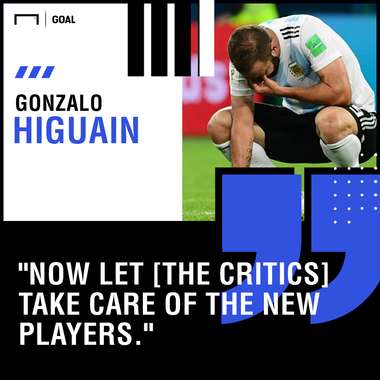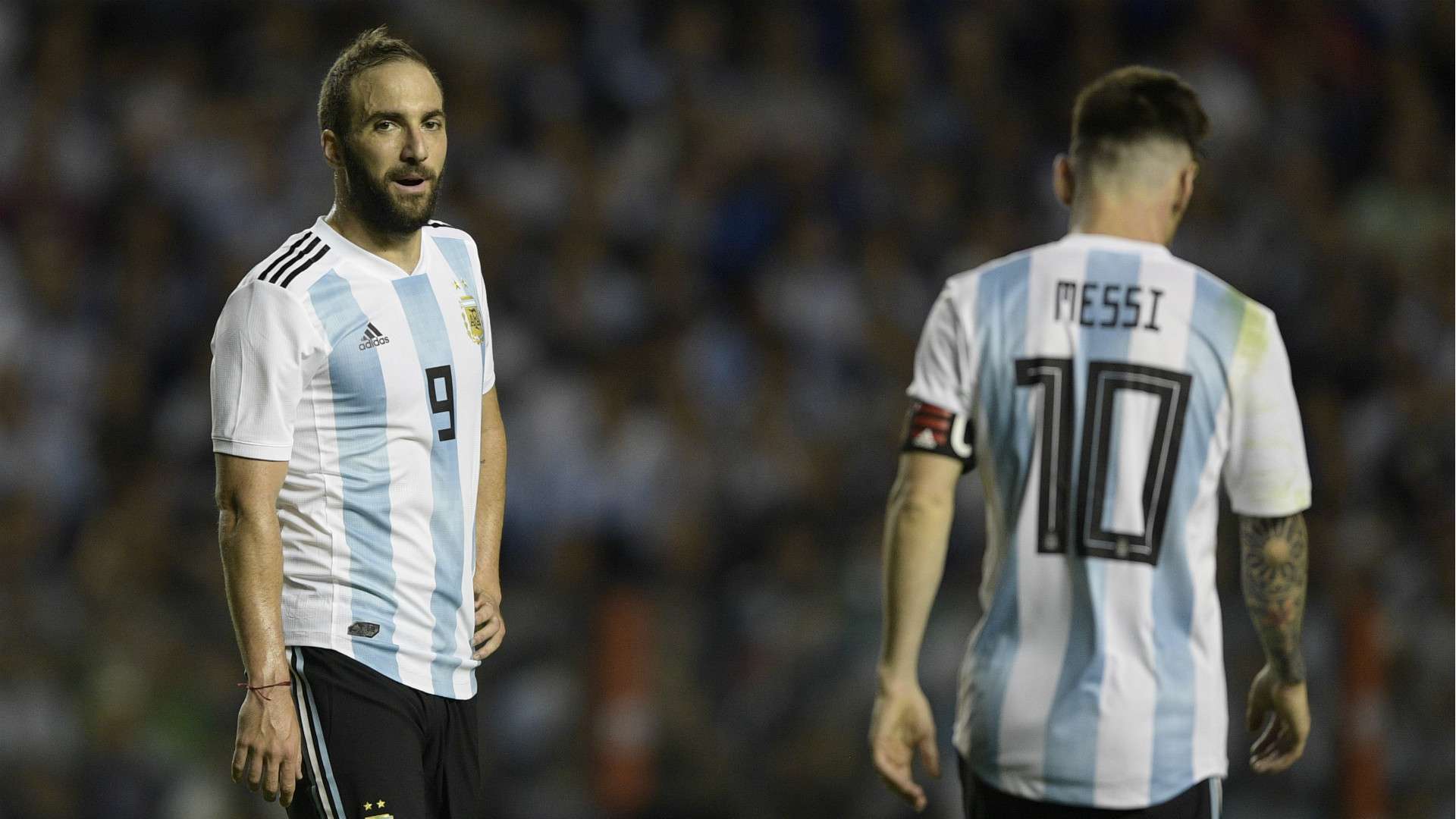"To the joy of many, and maybe not so much for others, my time is up."
The words chosen by Gonzalo Higuain to confirm a fact already known by most summed up the difficult relationship he has sustained for years with the Argentina national team and its fans.
Now, as Higuain himself suggested, they will have to find a new target for their vitriol. The Chelsea striker has retired from international football, ending an almost decade-long association that brought hope and despair to player and fans in almost equal measure.
There is no doubt that Pipita, who has called time on the Albiceleste at the age of 31, will go down as one of the best forwards ever to pull on the famous blue and white jersey. Under successive coaches he led the forward line, showing ample reserves of talent and sacrifice amid widespread instability.
In his nine years in active service Higuain was called to work under no less than six different trainers. Diego Maradona handed the Real Madrid youngster his debut in 2009, giving him a baptism of fire during a must-win World Cup qualifier against Peru with the team at its lowest ebb.
In what was perhaps a portent of the under-appreciation of his abilities that was to follow, Higuain's role in that game is all but forgotten. The image that sticks in everyone's mind from that grey spring evening in Buenos Aires is old Boca warhorse Martin Palermo tapping in during injury time to seal a 2-1 win and send his nation to South Africa, ripping off his shirt in celebration while Maradona launched into a swan-dive on the sidelines.
Amid such gripping drama Higuain's debut goal, converting a Pablo Aimar through ball with class to open the scoring, was merely a footnote in the story of the Miracle at the Monumental. Palermo and Maradona were the heroes, not the 21-year-old novice who was only just starting to make a name for himself at Real Madrid.
The pattern would continue throughout his international career. Higuain went onto score 31 goals for his nation, a tally just three shy of the great Diego.
Only two other players, Guillermo Stabile and Gabriel Batistuta, scored a hat-trick in Albiceleste colours during a World Cup. His goals were key to Argentina making three major finals in as many years.
But he will forever be remembered for the goals that did not go in, and as one of the men responsible for the gaping hole in Lionel Messi's medal collection where international honours should lie.
Twenty minutes in to the 2014 World Cup final against Germany, Higuain skewed a golden chance past Manuel Neuer's right-hand post. A year later, he skied his shoot-out kick to send Chile on the way to Copa America victory.
 Getty Images
Getty ImagesAgain in 2016, he was left rueing the one that got away. Another one-on-one, chipped past Claudio Bravo and past the goalpost. Argentina missed out again, Higuain's reputation as a big-game choker was sealed, however unfairly, and life in the national team was never the same for the striker, his faith and confidence seemingly cut to ribbons by the barbs of his many critics.
"I was on the verge of giving up playing," he admitted in March 2018 to TNT Sports. "I was close, but [my mother] told me not to, that I should carry on. If it were down to me I would have quit.
"I would have left football, which is something I love, but I love her more. She told me that I should look forward because she wouldn't let me leave something I love for her."
There would be no triumphant return to the Albiceleste, however. After managing just one goal in the entire World Cup qualifying campaign building up to Russia, Higuain lumbered through his nation's unconvincing group stage without hitting the net once before watching in frustration from the bench as France powered to victory.
Since the World Cup he has not been in contention at all, current coach Lionel Scaloni preferring younger, less experienced options up front with far less international baggage on their shoulders. And Pipita's club form, admittedly, has barely aided his case for selection: just 11 goals in all competitions for both AC Milan and Chelsea, far from a record that would make him impossible to overlook for the coming Copa in Brazil.
Perhaps that is why Higuain has chosen to make the first move. "You can now stop worrying about whether I am there or not," he added to Fox Sports in reference to his doubters, whom he has never been able to forgive for the torrent of abuse he received after each of Argentina's final failures.
"Now let [the critics] take care of the new players, a lot of people enjoy criticising more than supporting."

Higuain's record will speak for itself in the years to come. Perhaps when the dust settles he will gain the recognition he deserves for toiling and pushing himself to the limit for his country for years on end in the toughest of conditions, between institutional chaos, uncertainty on the bench and constantly living in the shadow of superstars like Messi and Sergio Aguero.
One demon, however, will never be fully exorcised. Pipita fell short when it mattered most for Argentina, missing chances that could have delivered the silverware so many in his nation demand almost as their birthright.
Messi carries on for his national team, still carrying the burden of waiting for his first triumph. How different it could have been for Barcelona's wizard, if his now-retired team-mate had placed his shots just inside the post and not erred in those painful final defeats.
